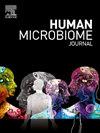Response to article “A retrospective outcome study of 42 patients with chronic fatigue syndrome, 30 of whom has irritable bowel syndrome. Half were treated with oral approaches, and half were treated with faecal microbiome transplantation”
Q1 Medicine
引用次数: 0
对42例慢性疲劳综合征患者的回顾性结果研究,其中30例患有肠易激综合征。其中一半采用口服方法治疗,一半采用粪便微生物组移植治疗。”
本文章由计算机程序翻译,如有差异,请以英文原文为准。
求助全文
约1分钟内获得全文
求助全文
来源期刊

Human Microbiome Journal
Medicine-Infectious Diseases
自引率
0.00%
发文量
0
期刊介绍:
The innumerable microbes living in and on our bodies are known to affect human wellbeing, but our knowledge of their role is still at the very early stages of understanding. Human Microbiome is a new open access journal dedicated to research on the impact of the microbiome on human health and disease. The journal will publish original research, reviews, comments, human microbe descriptions and genome, and letters. Topics covered will include: the repertoire of human-associated microbes, therapeutic intervention, pathophysiology, experimental models, physiological, geographical, and pathological changes, and technical reports; genomic, metabolomic, transcriptomic, and culturomic approaches are welcome.
 求助内容:
求助内容: 应助结果提醒方式:
应助结果提醒方式:


